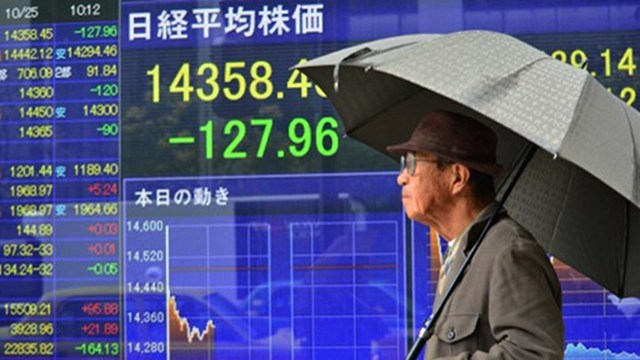SUMMARY
This is AI generated summarization, which may have errors. For context, always refer to the full article.

TOKYO, Japan – Japan on Friday, October 25, hailed a key inflation indicator touching a 5-year high as proof its “Abenomics” growth blitz was winning the war on falling prices, but analysts warned consumer spending had yet to gain traction.
Stripping out volatile fresh food and energy prices, which have largely driven recent increases, prices did not fall in September — deflation-plagued Japan’s best result since December 2008.
The broader consumer price index, which measures a basket of everyday goods but excludes the cost of fresh food, rose 0.7% in September from a year earlier, the 4th consecutive monthly rise.
Prime Minister Shinzo Abe’s government embraced the new figures, with officials saying its efforts to conquer deflation and stoke growth in the world’s third-largest economy were taking hold.
Economy Minister Akira Amari applauded the “good moves toward getting out of deflation”, and likened Tokyo’s battle to nearing the summit of the country’s iconic Mt. Fuji.
“Oxygen is getting thin but we’d like to hold out,” he added.
Abe’s efforts have started to bear fruit with the economy growing at an annualized rate of 3.8% in the first half of the year, far outpacing other G7 economies, while business confidence hit a 5-year high.
However, the upbeat headline for Friday’s data was tempered by the fact that prices were largely driven up by higher fuel bills, not surging demand for everyday goods like vacuum cleaners and clothes which power the economy as a whole.
While falling prices may sound like a good thing for shoppers, it can be bad for growth because they encourage consumers to put off spending, knowing they will pay less for a product if they wait.
That makes it difficult for companies to invest and discourages them from giving wage rises, which, in turn, reduces consumer spending further.
“Inflation data out of Japan highlighted how nervous consumers are,” said Chris Tedder, research analyst at Forex.com in Sydney.
It “puts the spotlight on a bigger problem in Japan: the lack of domestic demand… We think the problem is that household income isn’t increasing enough to justify consumers spending more”, he added.
Japan’s conservative premier has pledged to drag Japan out of its 15-year deflationary funk with a policy blitz dubbed “Abenomics”, lifting prices and wages to get the economy moving again.
Key to that effort is the Bank of Japan’s huge monetary easing drive, unveiled in April, and a 2% inflation target.
But Friday’s data showed the BoJ’s ambitious inflation target – to be reached in just two years – was still a long way off as consumers keep a tight rein on their spending.
“Things are heading in the right direction, just a bit slower than the BoJ would like,” Tedder said.
London-based Capital Economics also issued a downbeat assessment, saying “further increases in inflation should be more muted”.
Some firms are heeding Abe’s call to raise wages while also raising prices but that is largely due to a weak yen driving up material costs.
Abe and the BoJ’s hard-charging bid to stoke growth has helped push down the yen’s value against the dollar by about one-quarter since late last year — giving a boost to Japan’s exporters.
But the weaker yen has also driven up energy import costs which spiked in the wake of the Fukushima atomic disaster in 2011, forcing the shutdown of Japan’s nuclear reactors.
That forced Tokyo to turn to pricey fossil fuel imports to plug the gap, stoking ever-widening trade deficits as anti-atomic sentiment in Japan works against the government’s hopes to restart reactors once their safety could be assured.
Japan’s growth is also facing possible headwinds after Tokyo vowed to press ahead with a sales tax hike seen as crucial to shrinking a huge national debt, although critics fear it would derail a budding economic recovery. – Rappler.com
Add a comment
How does this make you feel?
There are no comments yet. Add your comment to start the conversation.